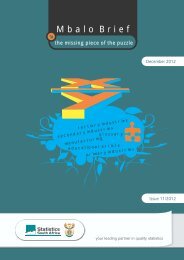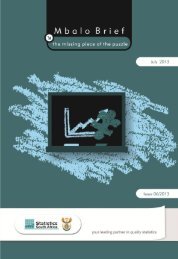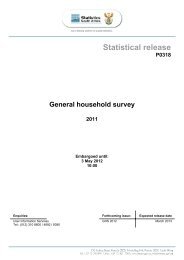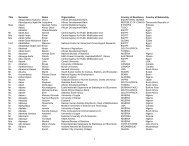Work Programme - Statistics South Africa
Work Programme - Statistics South Africa
Work Programme - Statistics South Africa
You also want an ePaper? Increase the reach of your titles
YUMPU automatically turns print PDFs into web optimized ePapers that Google loves.
Annexure 1: Strategic importance of statistics<br />
1.1 Introduction<br />
Systems of governance based on statistics are improving for the better in the 21 st century. Transforming and stable states<br />
use and apply systems of evidence as leadership, decision-making and statecraft instruments. Knowledge is essential for<br />
good decision-making and understanding and managing the spatial and temporal dynamics of economic, demographic,<br />
social, environmental and political development in the country. Such knowledge and understanding is possible where<br />
accurate time series statistical data and information exist within a statistical system. The biggest component of systems of<br />
<br />
218<br />
<br />
<br />
espoused in the Constitution (Act No. 108 of 1996). The Diagnostics Report was followed by the release of the National<br />
Development Plan which set out the road map for achieving Vision 2030. Modern, democratic and developmental states<br />
set clear long-term visions and a path towards achieving such visions. To monitor progress and tackle emergent challenges,<br />
these states rely on an arsenal of planning and information tools. Key amongst these is statistical information. Any<br />
development plan, and in particular a long-term development plan, must be based on evidence, which is the only true<br />
instrument that guides analysis, generates knowledge, facilitates understanding and emboldens the business and political<br />
decisions that are undertaken.<br />
<strong>Statistics</strong> are therefore essential for:<br />
Identifying emerging issues;<br />
Describing phenomena;<br />
<br />
Creating understanding;<br />
Presenting evidence;<br />
Anchoring business and political space for decision-making; and<br />
Undergirding planning, implementation, monitoring and evaluation.<br />
<br />
<strong>Statistics</strong> Act (Act No. 6 of 1999) provides for professional autonomy in the production of statistics without fear or favour.<br />
Statistical production must therefore be free of political interference. The <strong>Statistics</strong> Act (Act No. 6 of 1999) draws from<br />
<br />
<br />
<br />
The recent economic downturn in the <strong>South</strong> <strong>Africa</strong>n economy, accompanied by high unemployment and poverty, global<br />
environmental concerns, accountability demands, especially for the health of vulnerable groups such as women and children,<br />
<br />
new demands for statistical information.<br />
In response to these emergent challenges, the successive governments of <strong>South</strong> <strong>Africa</strong> sought to identify a set of key<br />
development indicators that provide evidence-based pointers to the changes in the economy and society. The platform of a<br />
planning and monitoring environment is anticipated in the <strong>Statistics</strong> Act (Act No. 6 of 1999). Sections 7 and 14 particularly<br />
<br />
Statistician-General.<br />
the <strong>South</strong> <strong>Africa</strong> I know, the home I understand















